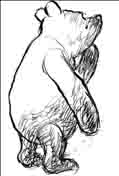 Teddy Bear, by A.A. Milne
Teddy Bear, by A.A. Milne
A bear, however hard he tries,
Grows tubby without exercise.
Our Teddy Bear is short and fat,
Which is not to be wondered at;
He gets what exercise he can
By falling off the ottoman,
But generally seems to lack
The energy to clamber back.
Now tubbiness is just the thing
Which gets a fellow wondering;
And Teddy worried lots about
The fact that he was rather stout.
He thought: "If only I were thin!
But how does anyone begin?"
He thought: "It really isn't fair
To grudge me exercise and air."
For many weeks he pressed in vain
His nose against the window-pane,
And envied those who walked about
Reducing their unwanted stout.
None of the people he could see
"Is quite" (he said) "as fat as me!"
Then with a still more moving sigh,
"I mean" (he said) "as fat as I!"
Now Teddy, as was only right,
Slept in the ottoman at night,
And with him crowded in as well
More animals than I can tell;
Not only these, but books and things,
Such as a kind relation brings -
Old tales of "Once upon a time",
And history retold in rhyme.
One night it happened that he took
A peep at an old picture-book,
Wherein he came across by chance
The picture of a King of France
(A stoutish man) and, down below,
These words: "King Louis So and So,
Nicknamed 'The Handsome!' " There he sat,
And (think of it) the man was fat!
Our bear rejoiced like anything
To read about this famous King,
Nicknamed the "Handsome." Not a doubt
The man was definitely stout.
Why then, a bear (for all his tub)
Might yet be named "The Handsome Cub!"
"Might yet be named." Or did he mean
That years ago he "might have been"?
For now he felt a slight misgiving:
"Is Louis So and So still living?
Fashions in beauty have a way
Of altering from day to day.
Is 'Handsome Louis' with us yet?
Unfortunately I forget."
Next morning (nose to window-pane)
The doubt occurred to him again.
One question hammered in his head:
"Is he alive or is he dead?"
Thus, nose to pane, he pondered; but
The lattice window, loosely shut,
Swung open. With one startled "Oh!"
Our Teddy disappeared below.
There happened to be passing by
A plump man with a twinkling eye,
Who, seeing Teddy in the street,
Raised him politely on his feet,
And murmured kindly in his ear
Soft words of comfort and of cheer:
"Well, well!" "Allow me!" "Not at all."
"Tut-tut!" A very nasty fall."
Our Teddy answered not a word;
It's doubtful if he even heard.
Our bear could only look and look:
The stout man in the picture-book!
That "handsome" King - could this be he,
This man of adiposity?
"Impossible," he thought. "But still,
No harm in asking. Yes, I will!"
"Are you," he said, "by any chance
His Majesty the King of France?"
The other answered, "I am that,"
Bowed stiffly, and removed his hat;
Then said, "Excuse me," with an air
"But is it Mr. Edward Bear?"
And Teddy, bending very low,
Replied politely, "Even so!"
They stood beneath the window there,
The King and Mr. Edward Bear,
And, handsome, if a trifle fat,
Talked carelessly of this and that ...
Then said His Majesty, "Well, well,
I must get on," and rang the bell.
"Your bear, I think," he smiled. "Good-day!"
And turned, and went upon his way.
A bear, however hard he tries,
Grows tubby without exercise.
Our Teddy Bear is short and fat,
Which is not to be wondered at.
But do you think it worries him
To know that he is far from slim?
No, just the other way about -
He's proud of being short and stout.
